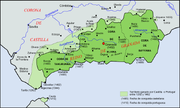
The Emirate of Granada (Arabic: إمارة غرﻧﺎﻃﺔ, Imarat Gharnāṭah), also known as the Nasrid Kingdom of Granada (Spanish: Reino Nazarí de Granada), was an emirate at the southern tip of Spain, established in 1238 following the defeat of Muhammad an-Nasir of the Almohad dynasty by an alliance of Christian kingdoms at the Battle of Las Navas de Tolosa in 1212. After Prince Idris left Iberia to take the Almohad leadership, the ambitious Mohammed I ibn Nasr established the last Muslim dynasty on the Iberian peninsula—the Nasrids. The Nasrid emirs were responsible for building the Alhambra palace complex as we know it today. By 1250, the Emirate was the last part of the Iberian peninsula held by the Muslims. Andalusian Arabic was the official language, and mother tongue of the majority of the population. For two more centuries, the region enjoyed considerable cultural and economic prosperity.
In the late 15th century, King Ferdinand II of Aragon and Queen Isabella I of Castile turned their eyes toward Granada. The Granada War began in 1482, with Christian forces capturing Alhama de Granada in February 1482. The Christian force was made up of troops provided by Castilian nobles, towns, and the Santa Hermandad, as well as Swiss mercenaries. The Catholic Church also encouraged other Christian countries to offer their troops and their finances to the war effort. Meanwhile, civil war erupted in Granada as a result of succession struggles in the Nasrid ruling house. By 1491, the city of Granada itself lay under siege. On 25 November 1491, the Treaty of Granada was signed, setting out the conditions for surrender. On 2 January 1492, the last Muslim leader, Muhammad XII Boabdil, gave up complete control of Granada, to the Castilian coalition.
Granada in "Report of the Special Committee on the Quality of Life"[]
By 1491, Spain's war against the Moors of Granada was nearly won. Jaime Nosénada's committee report urged a complete concentration of Spain's resources to bring the war to a swift and successful conclusion, and advised against diverting any resources to Cristóbal Colón's proposed voyage of exploration.[1]
References[]
- ↑ Departures, p. 142.
| ||||||||